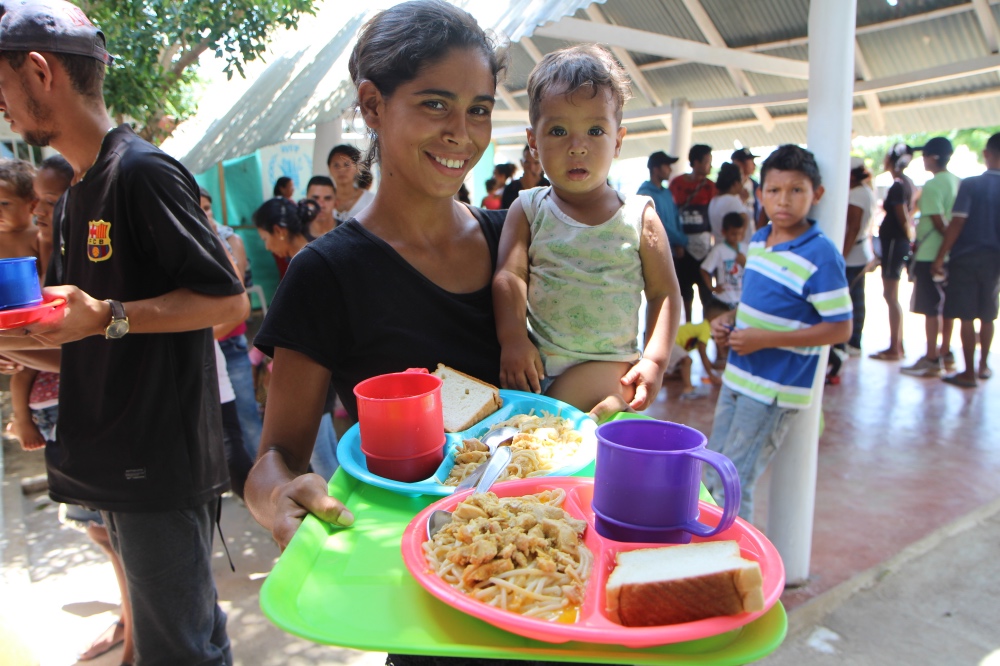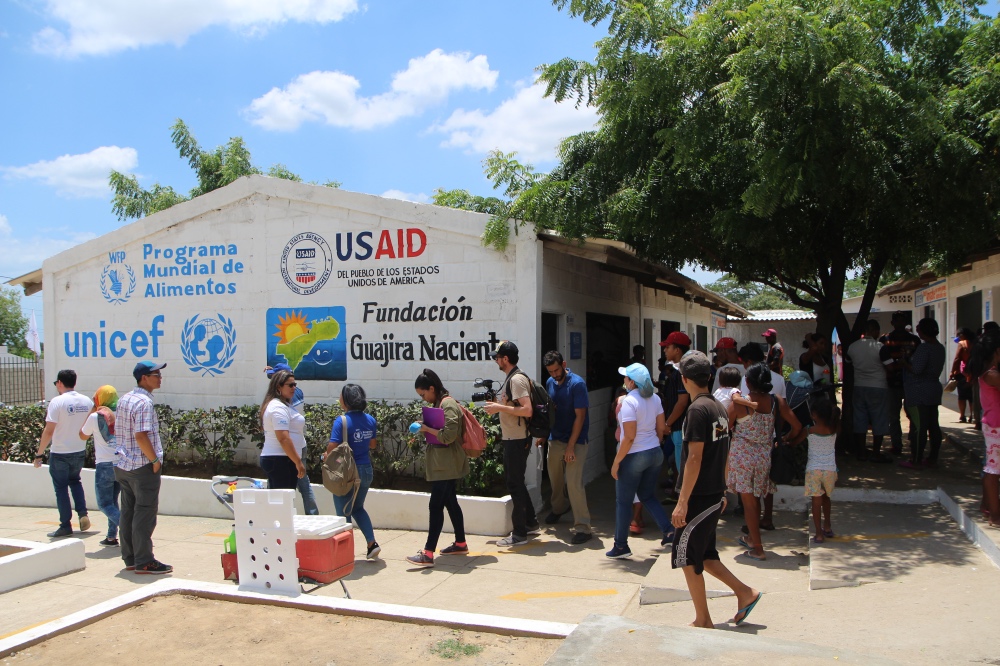Riohacha, Colombia
Thomson Reuters Foundation
It is mid-morning and the Rancheria community kitchen in northern Columbia is already full of families queuing for a free meal of pasta with chicken, bread and guava juice.
Hundreds of Venezuelan migrants rely on the community kitchen for survival, among them Marbellis Atencia, 39, who comes here every day with her three children.
But a funding shortfall threatens its future – even as Venezuelans’ desperate exodus over the border continues.

A Venezuelan mother and her child poses with the free meal they receive from Rancheria community kitchen managed by the United Nations World Food Programme in Riohacha town in La Guajira region on 5th June. PICTURE: Thomson Reuters Foundation/Thin Lei Win
“There was no food in Venezuela,” said Atencia, who has been searching for a job since her family arrived in Colombia nearly a year ago.
“When I try to find a job, I’m asked if I’m from Venezuela. And if I answer yes, they say, ‘No then, you come here to steal our jobs’,” the former housekeeper told the Thomson Reuters Foundation.
Services like these are desperately needed – the 18 community kitchens the United Nations’ World Food Programme operates in the desert-like La Guajira region bordering Venezuela fed nearly 100,000 migrants in June.
The agency has calculated it needs $US76 million in 2019 to respond to the Venezuelan migration crisis in Colombia alone, but it is facing a $US35 million funding gap.
Country director Carlo Scaramella told the Thomson Reuters Foundation that as demands on its services grew, WFP could be forced to reduce rations, help fewer people – or both.
“Donor support will continue to be critical to ensure that WFP can continue to provide assistance at scale to vulnerable migrants and local communities during the second part of the year and well into 2020,” he said.
Venezuela’s economic collapse has unleashed the biggest migratory crisis in recent South American history, with four million people leaving.
Funding shortfalls are also hitting other countries across Latin America hosting Venezuelan migrants and refugees.
In December 2018, a UN-led appeal by nearly 100 aid agencies requested $US738 million to help the fleeing Venezuelans, but less than a quarter has been funded.
But Colombia has taken the highest share, with 1.3 million migrants settling there, according to government data.
“Colombia has been extremely generous…But the situation can become more complex and stressed if resources are not available,” WFP’s Scaramella said, calling the situation “the beginning of a protracted emergency”.
Across Colombia, Venezuelan migrants can be seen on street corners and at traffic lights, appealing for work or spare change.
Many said they had fled economic and political crisis at home only to find themselves relying on handouts.

The compound of the Rancheria community kitchen managed by the United Nations World Food Programme in Riohacha town in La Guajira region on 5th June. PICTURE: Thomson Reuters Foundation/Thin Lei Win
Aid workers pointed out that the crisis came at a difficult time for Colombia, which signed a peace agreement with the Revolutionary Armed Forces of Colombia (FARC) rebels in 2016 after half a century of fighting.
Alan Bojanic, representative in Colombia for the UN Food and Agriculture Organization, said the country needed substantial funding.
“For a country that is still trying to solve problems of the war, like the 7.8 million people who were displaced within Colombia because of the violence, to have this on top…it’s a complicated scenario,” he said.
Colombian Foreign Minister Carlos Holmes Trujillo has promised his country will not close its doors, but has asked for international help as its health and education systems come under strain.
The community kitchen already provides sanitation, health and nutrition advice and help for pregnant and nursing mothers as well as meals. WFP field monitor Irma Diaz, who works there, spoke of the “desperation” of the pregnant women she meets.
“They do not know where to go…So we accompany them to the doctors and re-direct them to the health system,” she said, recalling a woman who gave birth a week after arriving.
Atencia said she still wanted to go back to Venezuela if she could – though that is unlikely to happen soon. Her mother, who had just arrived from their home town of Maracaibo, told her there was no electricity or public services there.
Phil Gunson, senior analyst for the Andes region with the International Crisis Group, said Colombia had been “as accommodating as it can be” of the migrants.
But he said the country did not have the resources to deal with an influx on such a scale, warning it risked creating a backlash.
“That will lead to political consequences that may be beyond the control of the current administration, and it is a matter of great urgency that the resources be found to assist Colombia with a problem not of its own making,” he said.
Meanwhile staff at the Rancheria community kitchen say they are still seeing about 400 new arrivals every week.
“We have funding until the end of the year…but I don’t think this situation is going to slow down or end by then,” said WFP field monitor Diaz.
“The numbers are stable and the needs will not decrease.”





